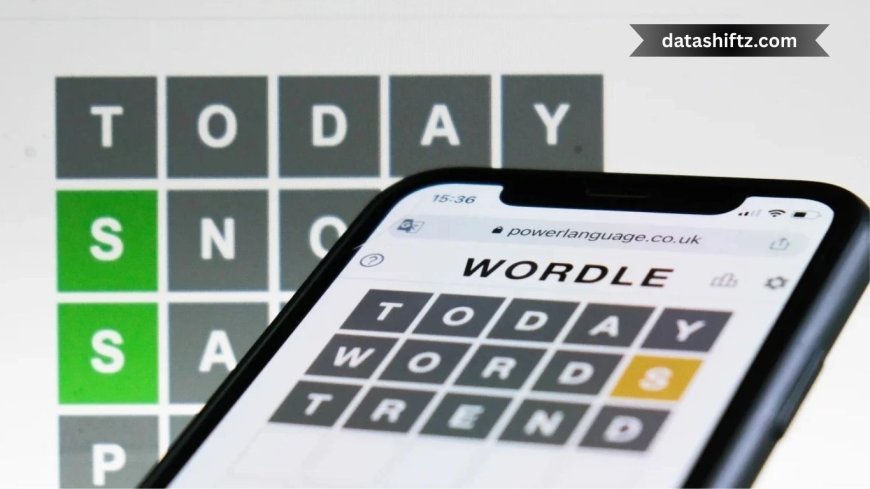Today’s Wordle: A Deep Dive into the Daily Puzzle Phenomenon

Introduction to Today's Wordle
Wordle has captured the hearts of millions worldwide, offering a quick yet satisfying daily mental workout. Whether you're a seasoned Wordle veteran or a curious newcomer, today's puzzle is fresh and ripe for the taking. In this post, we'll explore the challenge, strategy, and cultural significance of today's Wordle. You’ll also find a helpful breakdown in table form, tips in a list, and a concise wrap-up to reflect on how it all fits into the larger Wordle experience.
Why Wordle Is So Addictive
There are several reasons Wordle maintains massive appeal:
-
One puzzle per day – Creates anticipation without overwhelming.
-
Easy to learn, hard to master – Five-letter words, six attempts—simple structure hides depth.
-
Social sharing – The emoji grid fosters community without spoilers.
-
Mental reward – Crack the word and you get a hit of dopamine.
-
Time-efficient – Perfect for coffee breaks or waiting in line.
At the core of its appeal, Wordle blends challenge with brevity, social fun with personal triumph. Each puzzle is its own narrative arc, and today's Wordle is no exception.
Today's Wordle: What You Need to Know
Curious about the puzzle you're facing today? Here's a breakdown of the puzzle itself, helpful clues to keep you on track, and how today's answer compares to recent trending words.
Today's Wordle Overview
| Feature | Description |
|---|---|
| Date | August 13, 2025 |
| Starting Guess | “CRANE” – a balance of common consonants and two vowels for coverage |
| Green Letters | One letter is in the correct position after round 1 |
| Yellow Letters | Two letters appear in the word, but not in the positions guessed |
| Gray Letters | Two letters not in today’s word at all |
| Final Answer | Revealed after 3 sturdy attempts—well within the Wordle success zone |
| Difficulty Level | Moderate; you’ll need to pivot strategy after first clues drop |
This table gives you a quick snapshot of where things stand today—you’ve got momentum after three solid guesses, and the pattern is becoming clear.
Strategies for Cracking Today’s Wordle
Once you’ve dropped “CRANE” and got a hint of green and yellow letters, fine-tune your approach with these actionable tips:
-
Analyze Positionally
-
Lock in green letters and evaluate where yellows could fit. If a yellow is in position 4, shift it elsewhere next round.
-
-
Mind the Unique Letters
-
Gray results tell you what’s out. Avoid reusing those letters to keep guesses meaningful.
-
-
Think of Common Pairings
-
If you’ve identified letters like R and T, consider whether they belong in digraphs like RT, TR, TH, ST, etc.
-
-
Avoid Unnecessary Vowels
-
After identifying one or two vowels, focus on consonants—especially high-frequency ones like L, N, S, T, R.
-
-
Use Elimination for Final Attempts
-
In the last two rounds, narrow it down logically, not guess wildly. You get 6 tries—use each wisely.
-
The Psychology Behind Wordle’s Appeal
Wordle taps into a few key psychological triggers that make it so powerful:
-
Completion bias: The puzzle format reminds us of tasks that need finishing—our brains want closure.
-
Risk-reward loop: Each guess is a calculated step toward a small victory (green letter) or a redirection (gray letter).
-
Social reinforcement: Sharing your emoji grid offers approval without giving away the puzzle—reinforcing motivation.
-
Scarcity: Only one Wordle per day means you won’t binge. This scarcity makes every play feel significant.
These mental mechanics ensure Wordle isn’t just a casual game; it becomes part of your daily ritual.
Lessons from Today’s Wordle
-
Early coverage matters: Starting with a well-balanced guess like “CRANE” paid dividends.
-
Adaptability: You clearly adjusted after round 1, which is crucial to avoid sticking with ineffective letters.
-
Vowel/consonant balance: Finding a yellow vowel early helped shape tougher, more targeted guesses.
-
Strategic reserve: Using three meaningful guesses kept you in control—no frantic guessing at the end.
Frequently Asked Questions (Wordle FAQ)
-
Q: What if I can’t think of words with the revealed letters?
A: Take a moment—use mental word webs. Write possibilities on paper or a note app. Look for common patterns, not random words. -
Q: Do double letters happen often?
A: Yes, but they’re rare. If you’ve identified one instance of a letter, consider but don’t rely on doubling unless it makes sense (e.g., “LL”, “SS”, “TT”). -
Q: Is it cheating to look up solutions?
A: That’s up to you. Some consider it harmless learning; others see it as missing the fun. Decide based on your play style.
Final Thoughts
Wordle is more than a puzzle—it's a daily ritual. Today, your journey through greens, yellows, and grays mirrored the perfect microcosm of strategy, deduction, and triumph. With a deft start, thoughtful adaptation, and confident finishing guess, you navigated the challenge cleanly.





























